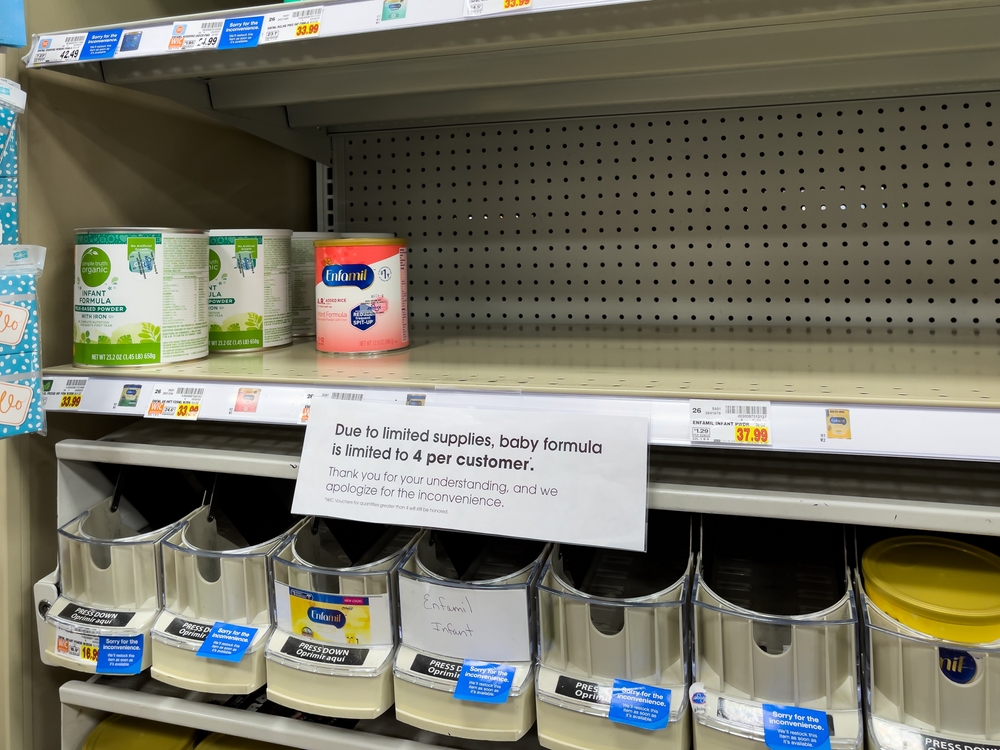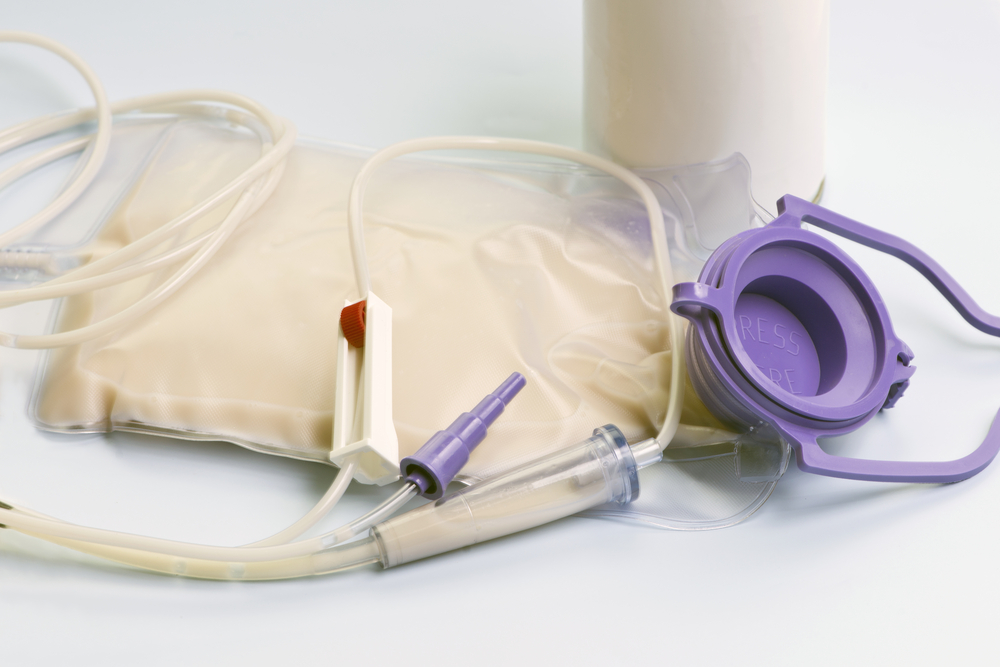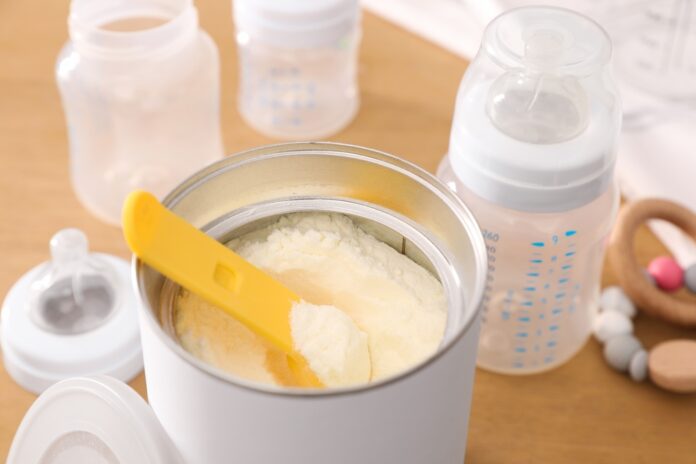The nationwide baby formula shortage is creating high stress among worried parents, leaving some babies hungry and/or ill and raising questions about how such a critical good could be in short supply throughout the U.S., one of the wealthiest nations in the world.
The shortage stems from a massive recall that began in February 2022, following the hospitalization of five infants (starting in September 2021) who consumed formula processed at Abbott’s plant in Michigan. Two children died because of bacterial infections caused by these products. Reports have circulated that a whistleblower, a former plant employee, shared food safety concerns with FDA officials and, subsequently, the plant was shut down.
Because Abbott is a primary formula supplier – not far off from being a market monopoly – families have been left scrambling. Remarkably, just four companies control nearly 90% of the U.S. formula market, according to NPR. And Abbott is a major producer of specialty formulas, which are essential for the well-being of many people even beyond infanthood. They’re consumed by children, teens and adults with food allergies and other medical conditions, including those with gastronomy tubes and/or disability needs that impede nutritional intake.
“People don’t realize that there are kids out there that have some serious medical issues that have to take these really specialized formulas,” Bryan Harding shared on TODAY. Bryan and his wife, Alison, have 16-year-old twins who rely on formula every day. Hannah and Sarah have cerebral palsy, seizure disorders, reflux and trouble breathing.

A Majority Need
The American Academy of Pediatrics (AAP) recommends that babies be breastfed exclusively until 6 months of age, with continual consumption of breastmilk along with other foods until about one year old. But the reality is that only one-quarter of babies in the country are exclusively breastfed by the time they’re 6 months old, and just 35 percent go on to achieve the 12-month benchmark.
You see, mothers may not breastfeed (or halt sooner than recommended) because of physical challenges, inability to lactate, insufficient parental leave and other reasons. Thus, the majority of American parents rely, solely or in part, on formulas.
Sharing is Caring Gets Complicated
In an effort to help those in need, some lactating mothers have committed to donating their breast milk – both formally and informally. Formal milk sharing typically runs through milk banks, like the Human Milk Banking Association of North America. Organizations like this conduct donor screenings, test milk to ensure safety standards and also pasteurize milk. But, because most milk from banks is distributed through hospitals for preterm babies, some parents are exploring informal sharing options. The AAP and the FDA, however, both discourage casual sharing because of the risk of contamination or poor quality.
The sharing of formulas can be less complicated than sharing milk. Thanks to social media platforms, families have created swap pages to donate or exchange formulas and help connect others to local supplies. Still, many have spent hours driving to find formula, searching online and calling in favors.
Born five weeks prematurely and underdeveloped, 4-month-year-old Cole requires a special nutrient-enriched formula. His mother, Megan Daniels, who lives in Florida, says she couldn’t find any formula canisters nearby. “I was fortunate that our out-of-state family in Pennsylvania and New Jersey found his specialty formula and sent it down to us,” she tells AmeriDisability. When the shipment arrived, Daniels even donated two canisters to other mothers of preemies who were in dire need. “It’s certainly scary!”

Lia Daley, mom to 5-month-year-old DJ, has been frantically looking for specialty formula too. The New York resident told Insider that her son suffered stomach issues when the shortage forced her to try different types of formulas. DJ has a milk allergy and needs a specific hypoallergenic formula. Similarly, Michigan mom Alison Zanella says tummy issues also arose for her 5-year-old son, Dominic, when a formula change was forced. Dominic has a rare form of neuromuscular disease plus food allergies. Unfortunately, dwindling hypoallergenic options are life-threatening.
As is the case for the Harding family as well. Because of yet another formula shift, Sarah developed a viral infection that required hospitalization. Doctors decided to change the twin’s feeding tube to bypass her stomach and, instead, go directly into her small intestine. Of course, so many other families are also grappling with health consequences and added hurdles due to this nourishment crisis.
Advice from Experts
The AAP warns parents to not feed homemade formula to infants. Babies should be fed only breastmilk or iron-fortified formula that’s prepared according to package directions. That means formula-to-water ratios should not be altered (in an attempt to stretch supply). Homemade concoctions can be harmful to infants, especially if nutritional quantities are off.
Need help locating formula? Here are resources:
- Your child’s pediatrician or your physician
- Feeding America, a nonprofit food bank
- Special Supplemental Nutrition Program for Women, Infants and Children (WIC)
- Supplemental Nutrition Assistance Program (SNAP)
- Temporary Assistance for Needy Families (TANF)
- Dial 2-1-1 or visit 2-1-1 online
The AAP has published common questions and answers associated with the formula shortage. Access this information by clicking here. Information published on AAP.org is more intended for medical professionals; however, AAP also hosts a parent website, HealthyChildren.org, with helpful guidance. If your loved one uses a specialty formula for allergies or other special health needs, the North American Society for Pediatric Gastroenterology, Hepatology & Nutrition has a list of comparable formulas to consider; but do consult with your physician as well.

Replenishing the Supply
In mid-May, Robert Ford, the CEO of Abbott, penned an apology in an op-ed published in the Washington Post. “We’re sorry to every family we’ve let down since our voluntary recall exacerbated our nation’s baby formula shortage,” wrote Ford. Adding, “We believe our voluntary recall was the right thing to do. We will not take risks when it comes to the health of children.” Ford also announced that Abbott will establish a $5 million fund to help those families with medical and living expenses until the supply crisis is relieved.
The White House administration is also taking action. In May, President Biden invoked the Defense Production Act to boost the production of baby formula and authorized the Defense Department to help fly formula in from overseas. The first overseas shipment, mostly containing hypoallergenic formulas, recently arrived in the U.S. Additionally, Abbott obtained approval from the U.S. District Court to release limited quantities of its EleCare specialty amino acid-based formulas.
This news is a relief for many, including Treva Worthy, whose 14-year-old, Ahmad, uses EleCare Jr. She told an NBC affiliate that her son has intellectual disabilities and severe allergies. Worthy admits that she felt desperate enough to resort to rationing Ahmad’s formula supply which, sadly, led to an unhealthy weight loss.
With a newly established agreement with the FDA, Abbott’s plant is set to reopen during the first week of June 2022 and will ramp up production of its formula products, with a priority to produce ample hypoallergenic formula. Many questions and concerns remain. Will this significant supply chain disruption alter how the formula market operates? Some are calling for evaluations of the lack of market competition, contract exclusivity and safety review processes. Time will tell…






